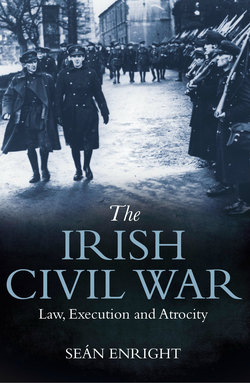Читать книгу The Irish Civil War - Seán Enright - Страница 14
На сайте Литреса книга снята с продажи.
ОглавлениеCHAPTER 5
Childers
He was not captured by chance: National Army intelligence officers had built a file on Childers and were actively looking for him. It had been known for some time that he was coming back to Ireland by ship: just before Michael Collins was killed he had directed that Childers be held as ‘a stow-away’, which, it was reckoned, would be sufficient to snuff out the threat. But Childers was an accomplished yachtsman and he got into the country undetected. He joined the anti-Treaty forces in Cork and after many weeks trying and failing to establish a role, he set off for Dublin on foot and got as far as Wicklow.1
The National Army got a tip-off as soon as he arrived at his cousin Robert Barton’s home in Wicklow. The raiding party was led by an officer who himself had been a fugitive at the house during the War of Independence. He knew that the maid came out of a side door early every morning to get milk. Just after dawn, Captain Byrne and his men crept up behind the house and surprised the maid at the door and forced their way in. Coming up the stairs, Byrne was challenged by one of the Barton ladies for his warrant. ‘This is no time to speak of warrants,’ he replied and pushed her away with the butt of his gun. Childers emerged from a bedroom holding an automatic. He made no attempt to use it but passed along the hallway with the gun at his side and at last it was wrestled from his grip. At the time, it was suspected that he was on his way up to Dublin to act as secretary to de Valera who had announced a new counter state, but until Childers produced a gun there had been nothing to hang a capital charge on him. All that had now changed.2
Trial
Childers was brought up to Dublin and held at Portobello barracks. The JAG later wrote that Childers had been roughed up after capture: his watch and cufflinks had been stolen and he had been kicked so hard he was unable to lie down. He was put down for immediate trial and he asked for legal counsel. Under the trial regulations, a prisoner was entitled to a lawyer if it was practicable and Michael Comyn was telephoned.
Comyn was then appearing at the Red Cow inquest.3 In the preceding months, he had appeared at many inquests, attempting to secure verdicts of murder against National Army forces, but jurors resisted efforts to make propaganda out of their verdicts and the Red Cow inquest was proving no different. Comyn left the inquest to his junior counsel and cadged a lift to Portobello in an army convoy. There he found his old friend chain smoking and drinking tea from a tin mug. Childers was then aged 52; clever, thin and usually impassive but for the ‘disdainful sniff’ that infuriated opponents. A few weeks before, he had been with the anti-Treaty forces that had retreated from Clonmel in a tearing hurry. When the dust settled, Childers sat down and wrote a thank you note to the hotel where he had been staying and enclosed a cheque for bed and board.4 Comyn had a brief conference with Childers. He was perfectly calm, Comyn recalled. Childers had been told that his trial was to take place in forty-eight hours and he had little to say to his counsel except: ‘There is no defence in fact. I had a gun.’5 He had already begun writing his last letter home to his wife Molly.
Comyn had defended many prisoners who lacked a defence and his most famous victory had been won in just such a case during the War of Independence.6 In that case, it was Comyn’s tactical acumen and his ability to spin the case out until the Truce that saved the lives of the prisoners and many others. Comyn also brought in Patrick Lynch, KC, another formidable advocate.7 On the day of the first four executions, Childers was tried by military court at Portobello barracks on a charge of being in possession of an automatic without proper authority. The trial was conducted in private; the press and the public were never admitted to these hearings nor was any public notice given of the trial. No defence was advanced to the charge, but counsel submitted a list of legal objections to the jurisdiction of the army tribunal. The fundamental point was that it had been open to the Dáil to pass a statute permitting trials by military court; it had not done so and therefore the trial was unlawful.
